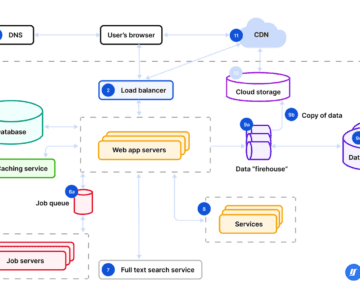Why Your Company Needs CRM Software?Starting a business is easy, but achieving success can be challenging. To run a successful business, you need the right mix of tools and solutions that set you apart from the competition. And because customers are the ones who will have the final word on whether your business is worth supporting, it's essential to focus your energies on connecting with them and giving them a positive experience.
Why Company Needs CRM Software Why Company Needs CRM Software?
The best way to retain customers and grow sales is by prioritizing your customer experience (CX). This means investing in customer relationship management (CRM) software. A CRM lets you broaden your sales pipeline, learn more about your customers, and deliver more value to them over the entire customer life cycle. From sales and marketing to customer service, CRM software is an essential tool that will benefit several departments in your organization.
The global CRM market is also projected to experience a compound annual growth rate (CAGR) of 12% between 2023 and 2030, according to a report from Fortune Business Insights. With so many companies taking advantage of the benefits offered by CRM software, you don’t want to get left behind.
Investing in CRM software is money well spent. Your return on investment (ROI) after adopting a CRM software will more than justify the money you spent on the adoption. According to a Nucleus Research report, the average ROI after implementing CRM software is $8.71 for every dollar spent! That’s nearly nine times the amount of returns compared to the initial investment, which is a strong argument in favor of using CRM software for your company.
If you haven’t yet found CRM software for your business, then this article is the perfect starting point. We will make a case for why you should get CRM software, cover the steps to build a custom CRM, and look at some of the challenges you might face when adopting new CRM software.
Let’s dive right in
Building Your Own CRM: Worth It?
Now that you’re convinced about the need for a CRM platform at your business, the next step is deciding what kind of CRM software you want to work with. While many businesses choose to build custom CRMs, it’s not absolutely necessary to do so. You can also shop for an off-the-shelf solution to help manage customer relationships.
Building a custom CRM platform requires time, money, patience, skill, and knowledge. Unless you have plenty of these resources to spare, it’s not advisable to take on the challenge of building a custom CRM for your business.
Instead, it would be much wiser to evaluate the prepackaged software solutions to see which most closely matches your business needs. It will save your company the expense of designing the software while still bringing you the most desirable benefits of using CRM platforms.
However, if you have an extremely specific list of requirements, investing in a custom CRM software for the long term would be better.
Let’s look at the options available for companies looking to implement a CRM platform. There are three main types of CRM software available today, and we shall examine each in turn.
- Ready-Made CRM Platform
The first option is a ready-made, off-the-shelf CRM platform. There are dozens of these on the market, including extremely popular and widely used ones like Salesforce, Zoho CRM, or Freshsales Suite.
The reason why these CRM software are so popular is because they are extremely convenient to begin using. You simply choose a pricing plan that works for you and train your team members to use the software. In just two simple steps, you’re ready to launch your new CRM and start reaping the benefits.
These ready-made CRM platforms come with a fixed list of features and a fixed amount of storage space. So unless the features list covers every single one of your business requirements, it’s not a good idea to go for a ready-made CRM software. They lack flexibility in terms of features and functionality, and the limited storage space makes scaling up operations tricky.
Another drawback of ready-made CRM software is that they can often be unjustifiably expensive if you have a large team, because they usually charge per user license.
The first option is a ready-made, off-the-shelf CRM platform. There are dozens of these on the market, including extremely popular and widely used ones like Salesforce, Zoho CRM, or Freshsales Suite.
The reason why these CRM software are so popular is because they are extremely convenient to begin using. You simply choose a pricing plan that works for you and train your team members to use the software. In just two simple steps, you’re ready to launch your new CRM and start reaping the benefits.
These ready-made CRM platforms come with a fixed list of features and a fixed amount of storage space. So unless the features list covers every single one of your business requirements, it’s not a good idea to go for a ready-made CRM software. They lack flexibility in terms of features and functionality, and the limited storage space makes scaling up operations tricky.
Another drawback of ready-made CRM software is that they can often be unjustifiably expensive if you have a large team, because they usually charge per user license.
Those who have found an effective CRM solution with ready-made platforms are lucky, but the rest of us need to keep looking for a more appropriate solution.
The first stage of building your own CRM platform is the most important, even though it might seem like it’s the stage where the least work gets done. This is the point where you need to clearly state the purpose of your CRM platform. That means listing the goals you wish to achieve by using the CRM platform, the users who will benefit from its adoption, and the specific benefits it will grant your business.
For example, some pre operational goals you can set for your custom-built CRM platform include:
- Streamlining sales processes and boosting sales numbers
- Increasing customer retention rate by identifying reasons for customer churn
- More productive lead generation and more efficient lead management
- Improving CX and raising the overall customer satisfaction rating of your company
As you can see, CRM systems are very versatile tools that can be put to various uses. Depending on the use case for your CRM platform, you will then be able to decide what type of CRM software you wish to implement. There are three main categories of CRM software, each with its own dedicated purpose. Let’s look at each type of CRM platform, and how they can be used.
Collaborative CRM System: Improves teamwork and communication within your company by promoting clear and transparent data exchanges. These types of CRM platforms have features like collective communication channels, file sharing capabilities, and activity streaming functions.
Analytical CRM System: As the name implies, these types of CRMs help with making plans and drawing insights based on customer and sales data. These types of CRM platforms must have analytical processing capabilities and data mining functions.
Operational CRM system: This type of CRM platform is designed to make business processes run smoothly. They increase employees’ work efficiency by automating important but time-consuming marketing and customer service tasks, like lead generation or sending follow-up emails to customers.
Each type of CRM platform serves a different purpose. Still, it’s important to remember that it’s possible for a single platform to cover all these bases when you are building a CRM from scratch. You can mix-and-match different features and create a comprehensive CRM solution for your business.
















